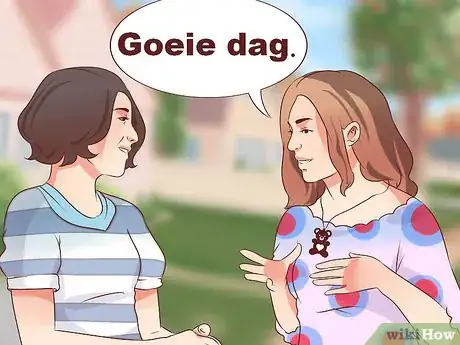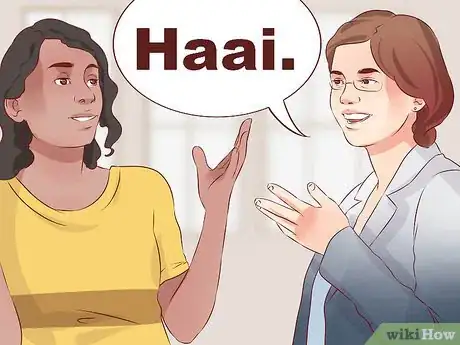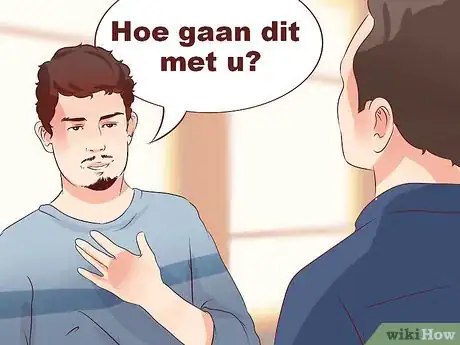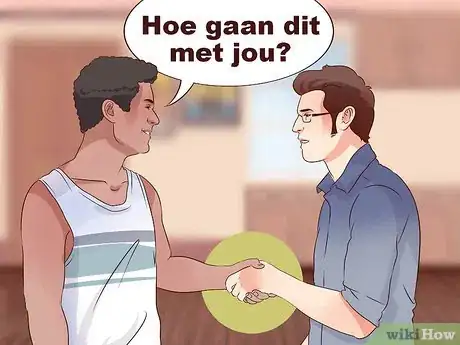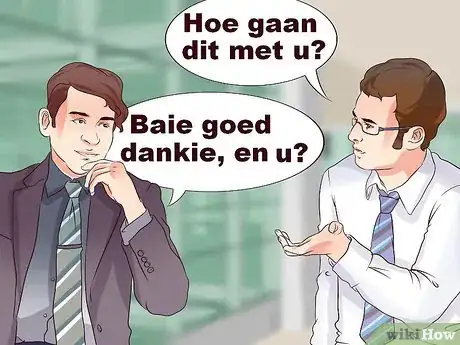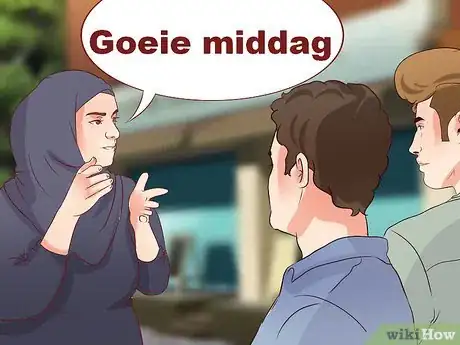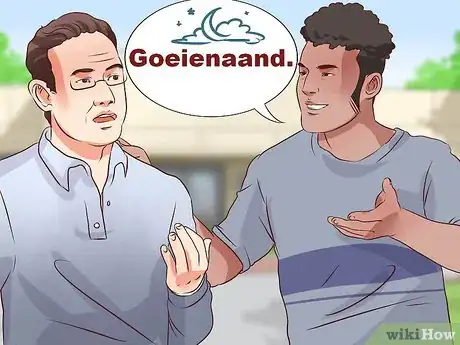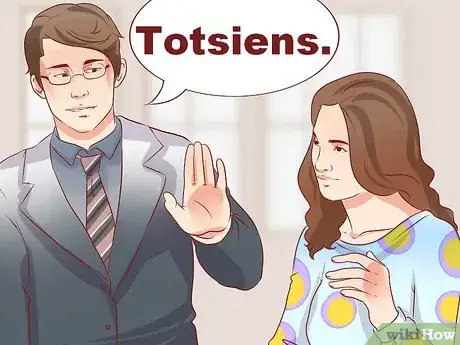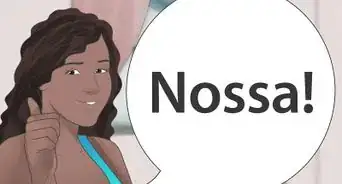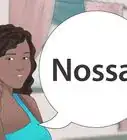wikiHow is a “wiki,” similar to Wikipedia, which means that many of our articles are co-written by multiple authors. To create this article, 18 people, some anonymous, worked to edit and improve it over time.
wikiHow marks an article as reader-approved once it receives enough positive feedback. In this case, 89% of readers who voted found the article helpful, earning it our reader-approved status.
This article has been viewed 232,836 times.
Learn more...
Afrikaans is a West Germanic language that derives from Dutch and is spoken mostly in South Africa and Namibia. Afrikaans is currently spoken by over six million people in Africa and is known for its unique phrases and slangs.[1] Typically, Afrikaans will greet each other with a handshake and women may kiss each other on the lips as a form of greeting.[2] There are also several ways to say “Hello”, “How are you?” and other greetings in Afrikaans.
Steps
Saying “Hello” and “How Are You?”
-
1Greet a stranger formally with “Goeie dag”. When you first meet someone, you should greet them formally as a sign of respect with the formal way to say “Hello” in Afrikaans.[3]
- You can also offer your hand to the person and shake their hand as a formal way of greeting. Many Afrikaner men will shake hands when they are greeting each other informally and the women will kiss each other on the lips. A man might kiss a woman and visa versa, especially if they are related or close friends. In a business situation, it is custom to greet all attending the meeting or gathering with a friendly handshake.
-
2Say “Haai” or “Hallo” if you are greeting an acquaintance or a friend. You can use the informal way to say “Hello” in Afrikaans if you know the person or are on familiar terms with the person. Many Afrikaners will greet each other with “Haai” or “Hallo” when they see each other on the street or in their homes.[4]Advertisement
-
3Use “Hoe gaan dit met u?” if you are greeting a stranger. The formal way to say “How are you?” in Afrikaans is “Hoe gaan dit met u?” It is considered polite to use the formal phrase when you are greeting someone you have just met.[5]
-
4Use “Hoe gaan dit met jou?” if you are greeting an acquaintance or a friend. The informal way to say “How are you?” in Afrikaans is “Hoe gaan dit met jou?” Only use this greeting if you are on familiar terms with the person you are speaking to.[6]
-
5Respond to “How are you?” formally or informally. To keep the conversation going, you can respond to the formal “Hoe gaan dit met u?” with “Baie goed dankie, en u?”[7]
- You can respond to the informal “Hoe gaan dit met jou?” with “Goed, dankie en met jou?”
- An example dialogue with someone you just met might be:
“Goeie dag!”
“Goeie dag!”
“Hoe gaan dit met u?”
“Baie goed dankie, en u?”
"Goed, dankie!" - An example dialogue with someone you know well or are friends with might be:
“Haai!”
"Hallo!"
“Hoe gaan dit met jou?”
“Goed, dankie en met jou?”
"Goed, dankie!" - A complete pronunciation guide for these greetings can be found at http://www.omniglot.com/language/phrases/afrikaans.php.
Using Other Greetings
-
1Say “Goeiemôre!” to greet someone in the morning. This is the formal way to say “Good morning” in Afrikaans.[8]
- Many Afrikaans speaking people will shorten this to “Môre!” as an informal way to say “Good morning”.
-
2Use “Goeie middag” to greet someone in the afternoon. This is how you say “Good afternoon” in Afrikaans.[9]
-
3Remember the difference between “Good evening” and “Goodnight” in Afrikaans. “Good evening” in Afrikaans is “Goeienaand”, and “Goodnight” is “Goeienag”.[10]
- Many Afrikaans speaking people will shorten “Goeienag” to “Nag” as an informal way to say “Goodnight”.
-
4Say “Goodbye” formally or informally. To say “Goodbye” to someone you just met, use the formal greeting: “Totsiens”.[11] “Totsiens” can also be used to say goodbye more casually, as it can be taken to mean “See you later”.
- Many Afrikaans speaking people will use “Mooi loop” when saying goodbye to a friend or a relative, which means “go/walk well”.[12]
- You can also add on to your “Goodbye” with “Lekker dag!”, which means “Have a nice day!”[13]
- An example dialogue with someone you just met might be:
“Goeiemôre!”
“Goeiemôre!”
“Hoe gaan dit met u?”
“Baie goed dankie, en u?”
"Goed, dankie!"
“Totsiens! Lekker dag!” - An example dialogue with someone you know well or are friends with might be:
“Môre!”
"Môre!"
“Hoe gaan dit met jou?”
“Goed, dankie en met jou?”
"Goed, dankie!"
"Totsiens, mooi loop!” - A complete pronunciation guide for these terms can be found at http://www.omniglot.com/language/phrases/afrikaans.php.
Community Q&A
-
QuestionHow do I say "I miss you" in Afrikaans?
 Community Answer"Ek mis jou" (mis and miss are pronounced the same).
Community Answer"Ek mis jou" (mis and miss are pronounced the same). -
QuestionHow do I say "that's all, thank you" in Afrikaans?
 Community Answer"Dis al, baie dankie."
Community Answer"Dis al, baie dankie." -
QuestionHow to say "my name is" in Afrikaans?
 Community Answer"My name is..." is basically "My naam is..." You could also use "Ek is" or "Ek's," the Afrikaans equivalent to "I am" or "I'm."
Community Answer"My name is..." is basically "My naam is..." You could also use "Ek is" or "Ek's," the Afrikaans equivalent to "I am" or "I'm."
References
- ↑ http://www.omniglot.com/language/phrases/afrikaans.php
- ↑ http://buzzsouthafrica.com/afrikaan/
- ↑ http://www.omniglot.com/language/phrases/afrikaans.php
- ↑ https://mylanguages.org/multimedia/afrikaans_audio_phrases.php
- ↑ http://www.omniglot.com/language/phrases/afrikaans.php
- ↑ https://mylanguages.org/multimedia/afrikaans_audio_phrases.php
- ↑ https://mylanguages.org/afrikaans_phrases.php
- ↑ https://mylanguages.org/afrikaans_phrases.php
- ↑ https://polymath.org/afrikaans_greetings.php
About This Article
To greet a stranger formally in Afrikaans, say “Goeie dag” and extend your hand out for a handshake. Then, you can follow up with “Hoe gaan dit met u?” for “How are you?” Alternatively, if you’re greeting an acquaintance or a friend, use the informal “Haai” or “Hallo” to say “Hello.” You can then ask them “How are you?” by saying “Hoe gaan dit met jou?” If you want to greet someone by saying “Good afternoon,” try “Goeie middag.” You can also tell someone “Good evening” by saying “Goeienaand.” To learn how to say goodbye in Afrikaans, keep reading!
